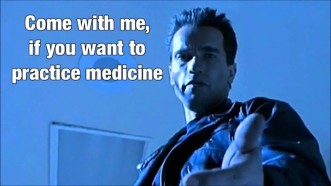In a couple of hours, I’ll be spending time with several people pursuing their dreams of a career in medicine. I really enjoy getting a chance to meet these future docs as they contemplate applying to my alma mata St. George’s University. I remember how tumultuous the entire experience of applying to medical school felt.
It was at the turn of the millennium when everything changed for me. My worries at that time paled in comparison to the entire planet panicking about the Y2K bug and the end of mankind. I was simply trying to get into medical school. I just wanted an opportunity to put on that white coat, attend classes, prove my worth on the wards and then practice medicine in the Y2K post-apocalyptic future. That is all I wanted. But after 3 attempts, I was denied by countless US medical schools and my future appeared as bleak as the future depicted in the Terminator movie series where “SkyNet” or in our case the Y2K bug destroys the world and enslaves humanity. With each rejection letter, it really did feel like the end my world was approaching.
But just like Hollywood, this story had a happy ending. The world along with my hopes survived Y2K. I rested my hopes on the proverbial hero that gave me a chance and rescued me from a path and alternate endings to my story that I cannot imagine today. Just like in that classic scene of the Terminator where Arnold Schwarzenegger reaches out to the protagonist Sarah Connor and says “Come with me if you want to live, ” I feel like St. George’s reached out to me and said “Come with me if you want to practice medicine.”
And with that, the rest is history.
15 years later, I’m doing what I love. Staying with my silly Terminator analogies, I feel like John Connor, leading the resistance. I’m making a difference in people’s lives while fighting for the future of our broken healthcare system.
That fight is another story and sequel to this saga. 🙂
